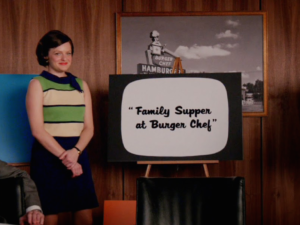 I love the television show Mad Men. The characters and their storylines were immediately and continually compelling and surprising to me. The sets and costumes evoke ever-fading memories of my early childhood – I remember some of those outfits on my mother and the styles of kitchens in particular.
I love the television show Mad Men. The characters and their storylines were immediately and continually compelling and surprising to me. The sets and costumes evoke ever-fading memories of my early childhood – I remember some of those outfits on my mother and the styles of kitchens in particular.
I’ve been rewatching Mad Men in the last few months, and I was struck by something I hadn’t remembered: how much I love the fictional advertising firm’s use of simple storytelling for clients in order to sell ideas. I am as spellbound as the pretend clients on the show during these sessions. With no Powerpoint presentation, no high tech, just words and maybe a still image, the advertising staff use compelling words, tone of voice, eye contact and subtle body language to sell concepts that evoke emotions so strong that, sometimes, clients tear up. It’s theater, without the clients knowing that it is, without the clients knowing there is acting happening. It’s the art of story-telling through talking.
Here are three examples of how effective the Mad Men low-tech approach could be:
Note that the first thing the ad person in these scenes does is set a mood, just by talking. You see moving images as they start pitching an idea, even though no moving images of whatever they are trying to sell are shown. Every time, they are telling a story, and you want to hear that story. You are intrigued, and you listen.
I have no idea how many times I have sat in an audience or meeting room and waited for someone to get the computer started, get the wireless network connected, get the software booted up, make sure the sound is working, and on and on, in order to start or continue telling me about some idea. By the time they begin, or continue, the room is often not in-the-moment anymore, and there’s nothing the presenter can do – the presentation can’t be altered based on the changed mood of the audience and the presentation can’t adjust the message to the moment.
I also have no idea how many times I’ve changed how I am going to do a workshop or presentation because of reading the room. I walked into a room to do a workshop and found just five people in my audience, so instead of turning on the overhead, I had everyone come up to the front of the room, we sat in a circle, I opened my laptop in case I needed to reference it, but I did a discussion instead of the lecture. We talked. I still did my presentation, but it didn’t feel like a presentation. It wouldn’t have worked with 50 people. As a result of experiences like this, I always ask to have a flip chart and markers in the room where I will present because I may suddenly find that we need to have a spontaneous brainstorming session in order for me to keep the room engaged and to ultimately sell the idea I’ve come to pitch to the group.
Mad Men reminds me of the importance of being able to not rely entirely on a pre-programmed presentation and technology, and instead, knowing what the heart of a message is, the key points, the essence, and being able to say such in a way that feels honest. Polish isn’t the most important thing – the substance and feeling of sincerity is, as well as a clear speaking voice. Yes, of course, I use visual aids and technology sometimes – but I always remember that it’s the message, not the tech, that needs to shine.
I’ll save my thoughts about the way Mad Men perfectly shows what women in the workplace face, even today, for another blog…
Also see:

